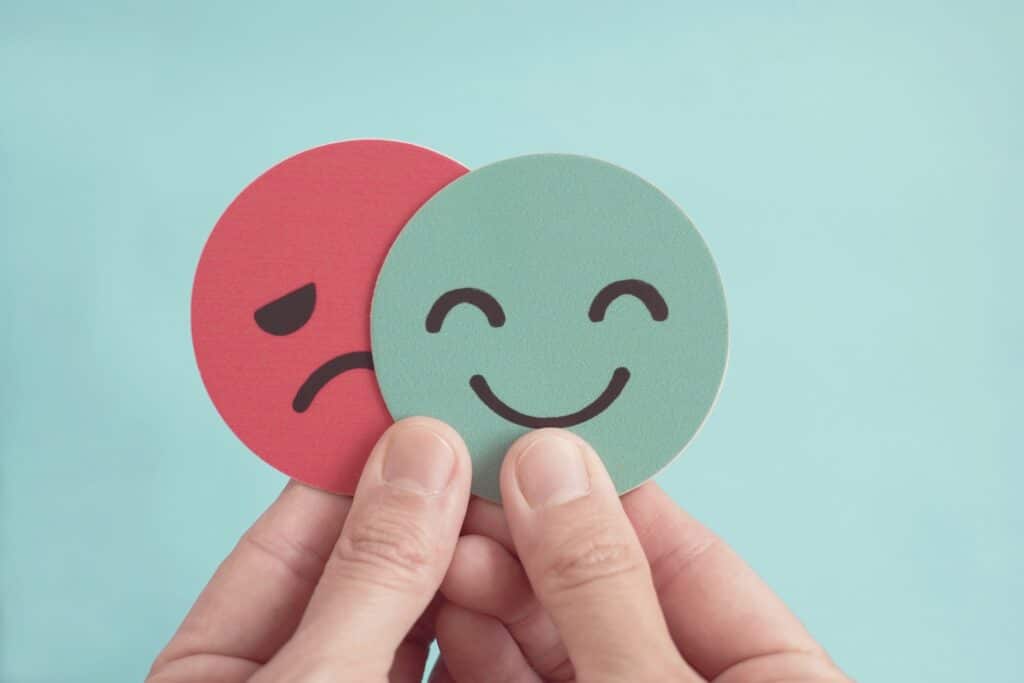Immediate Availability - Open 7 days a week - day, evening and weekend appointments
Immediate Availability - Open 7 days a week - day, evening and weekend appointments
CBT is based on the idea that the way we think and feel determines how we act. This therapy empowers you to better cope with stressors and is commonly used to help with depression, anxiety, trauma, and self-esteem concerns to improve overall well-being.
How do you react to negative experiences, both emotionally and behaviourally? In a stressful situation, we react in mere seconds. Our minds move fast, but if you slowed down your thoughts, you’d notice something like this: Thought patterns affect feelings, affect behaviours. Negative thought patterns can become so ingrained that it’s hard to notice them.
When you become aware of your habitual thinking patterns and begin to challenge your negative thoughts, you change the way you feel and how you interact in the world. This is what CBT is built on. A fundamental part of CBT is awareness. You work backward from your behaviours to understand why you act the way you do; reflecting on previous situations, triggers, and stressors gives you the opportunity to learn from these events and react in a more constructive way in the future.
Consider all the factors in your life that impact your feelings and emotions, including your relationships, home life, career, and current stressors. You’ll learn to develop positive thinking patterns, knowing that while these factors still exist, you can untangle your knee-jerk thoughts and, as a result, progressively change your behaviour.
A few examples include:
Another fundamental of CBT is control. In life, we can’t always control our circumstances. You’ve probably heard this quote before: "You can’t change how people act, but what you can change is how you react." - Bonnie Hammer. You can empower yourself by focusing on what you can control. Change the way you experience and react to life with CBT.
CBT is based on the principle that thoughts, feelings, and behaviours are interconnected—a relationship often described as the “thought-feeling-behaviour triangle.” When one part of this triangle becomes negative or distorted, it can affect the other two, creating a loop that feels hard to escape.
Think about the last time you felt overwhelmed by work deadlines or avoided a conversation with a friend, partner, or loved one because it seemed too hard. CBT equips you with tools to reframe your thoughts (“I can’t do this” becomes “I’ll take it one step at a time”) and take action instead of shutting down.
Imagine CBT as untangling a messy knot or rewiring a faulty circuit. The process is deliberate, but the results can help life flow more smoothly. Each session equips you with more tools to tackle stressful situations in your life, creating an iterative process where you can witness real improvement and change over time.
CBT stands out because it’s not just about talking—it’s about doing. You’ll leave sessions with practical tools and strategies you can apply in your daily life. This “therapy with homework” approach ensures you’re always moving toward meaningful progress. You’ll understand the power you hold to shape your life and experiences, as well as the components that are outside of your influence.
It’s also incredibly adaptable. Whether you’re facing anxiety, insomnia, or low self-esteem, CBT can be tailored to address your specific challenges. And it’s not just for those with mental health diagnoses—it’s for anyone who wants to feel more in control of their thoughts and behaviours.
Best of all, CBT is grounded in science. Research consistently shows it’s one of the most effective therapies for a wide range of issues.

CBT is for anyone who wants to change how they think, react, and behave. You don’t need to be diagnosed with a mental illness to benefit from CBT. You’ll learn how to change the way you react to difficult situations. And, you’ll also learn how to do this by yourself. This creates a sense of independence and self-sufficiency that empowers you. All of us deal with stressful situations; CBT teaches you how to tolerate difficult emotions and alter your behaviour.
CBT provides a variety of tools designed to help you manage life’s challenges.
Picture using a thought journal to jot down your most persistent negative thoughts. Then, with the help of your therapist, you identify why those thoughts feel so powerful—and how to challenge their hold on you. Or imagine breaking a daunting task into bite-sized steps that feel manageable, giving you the momentum to keep going.
CBT isn’t just about fixing what’s wrong—it’s about building self-awareness and resilience so you can handle whatever life throws your way. Studies show CBT can reduce symptoms of anxiety in 60-80% of patients, giving hope to those who feel stuck.

Is this your first time seeking counselling services? Here’s an overview of what to expect:
CBT is a type of psychotherapy that emphasizes how to change your current situation. What circumstances in your life are actively causing you stress or anxiety? After identifying some of your challenges, your therapist will teach coping skills and strategies to deal with those situations.
Sometimes, it’s hard to view your habits and circumstances from another perspective. With CBT, you gain insights from a professional therapist who can point out distortions in your thought patterns where feelings override logic and identify what you can do to make lasting changes.
Starting therapy can feel like a big step, but knowing what to expect can ease some of that nervousness.
In your first CBT session, you’ll:
Sessions are always tailored to your comfort level, creating a judgment-free space where you can explore and grow. Many clients say they leave their first session feeling lighter, with a new perspective and a sense of hope.

To get the most out of your treatment, it’s best to be as honest with your therapist as possible. Ask yourself: What behaviours am I seeking to change? What situations do I need help coping with? Understandably, this can be difficult. Remember that therapy is a supportive environment; you will be heard without judgment and treated with respect. We recommend coming into your treatment with a goal in mind. Then, your therapist can design a treatment plan to set goals, target certain behaviours, and achieve your desired outcome. If you’re looking for examples, here are a few:
There are several key differences between CBT and DBT. Namely, CBT focuses on changing negative thought patterns, while DBT aims to help emotional regulation and improve distress tolerance. Individuals living with Borderline Personality Disorder or severe depression benefit more from DBT, which is effective in reducing substance abuse, suicide attempts, and self-injury. Further, DBT is generally more focused on interpersonal relationships and communication with others compared to changing thought patterns.
At One Life, we offer both types of behavioural therapy and encourage you to connect with us to determine which path would be the best for your needs.
Therapy of any kind is an investment in yourself. If you want to see real change in your life that starts at the source, then yes. While our therapists can help establish a strong understanding of patterns and behaviours, it’s important to note that the value and, by extension, cost of therapy are about more than money. You must also invest time and effort into your sessions and the homework assigned to apply to your everyday life, which may feel taxing at times. However, that also means the “worth” you get out of your CBT sessions is completely within your control.
Without an assessment of your needs and understanding of your current situation, it’s not possible to determine the exact number of sessions required for CBT. We recommend front-loading your counselling with weekly or bi-weekly sessions to get your momentum going in the first few months. This will help establish a clear path and defined rhythm that works best for your unique needs.
Absolutely. Anxiety influences the way you think and your behaviour, two main aspects addressed in CBT sessions. While each and every person experiences anxiety from various stressors, the fundamental way the brain processes these events is remarkably similar. CBT works in a multi-pronged approach, supporting the dismantling of triggering or “bad” feelings and behaviours with the reinforcement of positive ones.
If being able to use your insurance benefits is an important factor in your selection, our team would be happy to recommend one of our therapists who's services are covered by most insurance plans. Please be sure to confirm in advance if insurance coverage is preferred.
Our standard fees are aligned with the recommended fee schedule from the Psychologists' Association of Alberta’s recommended schedule. However, we offer the added value of 60-minute sessions in contrast to the recommended 50-minute session for this fee.
"*" indicates required fields